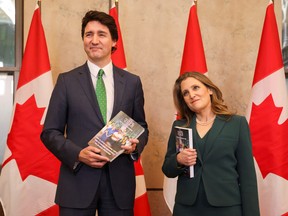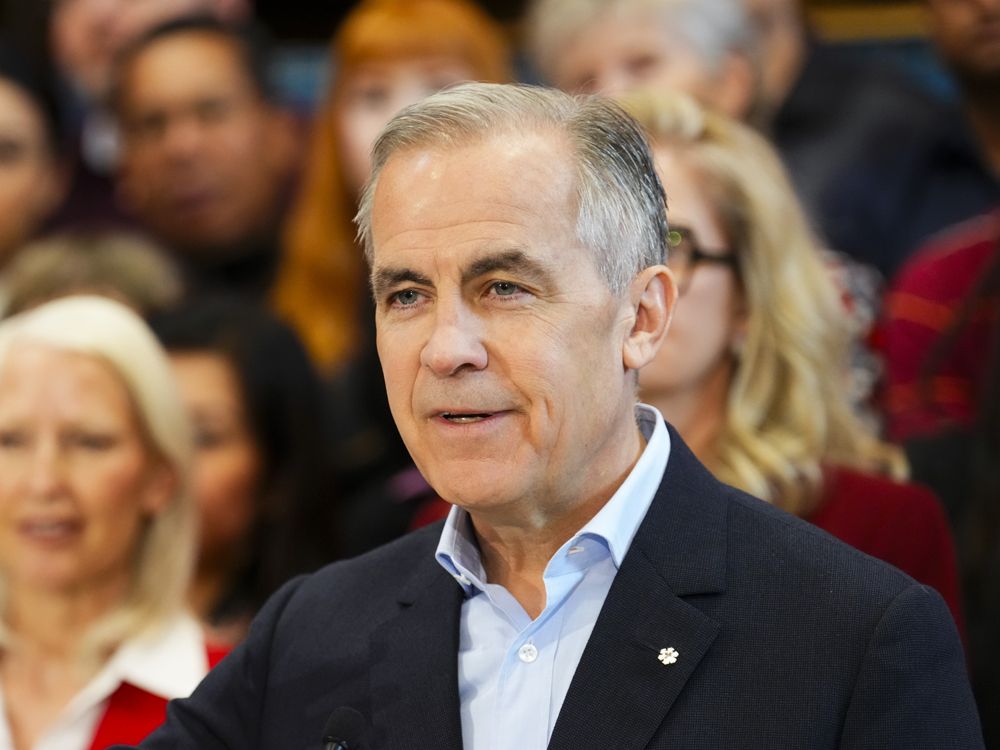Business lobbyists, labour leaders and economists offered mixed reviews

Article content
Business lobbyists, labour leaders and economists offered mixed reviews of Finance Minister Chrystia Freeland‘s 2023 budget. Here are some of the highlights:
Advertisement 2
Article content
Perrin Beatty, Canadian Chamber of Commerce
Article content
The head of Canada’s biggest business lobby said in a statement that the federal government missed an opportunity to introduce measures to encourage private sector investment by fixing a “broken regulatory system” and eliminating barriers to interprovincial trade.
Article content
“Our country cannot borrow its way to prosperity,” Perrin Beatty, president of the Canadian Chamber of Commerce said. “Canada’s businesses are anxious to do their part, but the federal government needs to see them as partners, not problems, in building a more successful Canada.”
He said later on BNN Bloomberg that the government was “writing cheques on a bank account that’s already overdrawn.”
Pierre Gratton, Mining Association of Canada
Advertisement 3
Article content
The mining sector received a boost, as the federal government proposed a 30 per cent tax credit for investments in equipment and machinery needed to extract, process and recycle critical minerals that power electric vehicles, such as lithium, copper and rare earths. This follows Ottawa’s decision to invest $3.8 billion in the country’s critical minerals sector last year.
Pierre Gratton, head of the Mining Association of Canada, said in a statement that he is optimistic that the new initiative, along with the previous steps taken by the government would “attract new private sector investment into Canada’s mining, smelting and refining industry.”
Prior to the announcement of the budget, Gratton told the Financial Post that Ottawa wasn’t doing much to support Canadian miners nearing construction and that the country’s strategy to build an electric vehicle industry could fail if the government doesn’t encourage miners through tax credits and other incentives.
Article content
Advertisement 4
Article content
Bea Bruske, Canadian Labour Congress
The head of the country’s largest labour organization said in a statement that the government’s move “to attach strings to tax credits to ensure that investments in clean energy create good jobs is positive.” Bea Bruske, leader of the Canadian Labour Congress, also lauded the decision to expand dental care, which she said would benefit nine million Canadians.
However, the government “missed an opportunity to overhaul” the Employment Insurance (EI) system and invest in prescription drug coverage for all Canadians. “The affordability crisis means public programs like universal pharmacare and EI are more critical than ever,” said Bruske. “It is disappointing that the federal government continues to resist calls to implement a full pharmacare program and fix our inadequate EI system.”
Advertisement 5
Article content
The proposed grocery rebate would provide “some relief,” said Bruske, but it fails to tackle the root of the problem, which she said was, “corporations putting profits before people.”
Dan Kelly, Canadian Federation of Independent Business
The head of the Canadian Federation of Independent Business said he was pleased the federal government secured agreements from major credit card companies Visa Inc. and Mastercard Inc. to reduce the fees smaller businesses are charged when customers use credit cards.
Despite the 27 per cent reduction in small business merchant fees, which the government said would save such companies $1.5 billion when combined with other measures introduced in 2020, the CFIB said the 2023 budget didn’t go far enough to help its members with the heavy debt loads taken on during the COVID-19 pandemic.
Advertisement 6
Article content
“We were disappointed by the lack of meaningful debt relief for small businesses in the budget, when more than half are still carrying pandemic-related debt at an average of $105,000,” Kelly said.
“An extension to the Canada Emergency Business Account (CEBA) loan repayment deadline of Dec. 31, 2023, is desperately needed and will be a major priority for CFIB in the weeks ahead.”
Dennis Darby, Canadian Manufacturers & Exporters
Dennis Darby, president of the trade association that represents exporters and factory owners, could barely contain his enthusiasm with a budget the promises to spend billions of dollars on overhauling the economy to run on electricity.
“Ongoing labour shortages, the U.S. Inflation Reduction Act’s negative impact on manufacturing investment in Canada, and the high costs of transitioning manufacturing production to a net-zero future all needed to be addressed or Canada risked missing out on the next generation of manufacturing production,” Darby said in a statement. “We were pleased to see the budget respond on all these fronts and believe the investments made today into Canada’s industrial capacity are good first steps in strengthening our sector.”
Advertisement 7
Article content
Benjamin Bergen, Council of Canadian Innovators
Benjamin Bergen, who leads a lobby group that represents some of Canada’s fastest growing tech companies, was much less enthusiastic than his counterpart at the Canadian Manufacturers & Exporters. Bergen’s members are enduring a rough patch. Financial markets have soured on technology companies that promise future growth while piling up losses in the present, and the collapse of Silicon Valley Bank, a major tech lender, caused even more worry about the industry’s short-term prospects.
“We are in a difficult and uncertain economic environment for the tech sector, and today’s budget did little to support Canada’s most promising businesses through a challenging time,” Bergen, president of the Council of Canadian Innovators, said in a statement. “While we appreciate the government’s commitment to Canada’s clean technology sector, the fact remains Canada’s innovation policy still lacks a focus on the key ownership and intellectual property tools that build real, lasting national wealth. A cleantech strategy without a real plan in place to protect these assets will just keep subsidizing other countries’ success. We need to see a strong signal that Canada won’t be subsidizing other countries’ prosperity with a status-quo approach to intellectual property.”
Advertisement 8
Article content
Kendall Dilling, Pathways Alliance
A small but elite association that represents Canada’s six largest oil companies offered a measured response to the budget, hinting that it still hasn’t heard what it needs to hear from Ottawa in order to deploy large investments in decarbonizing projects such as carbon capture and storage.
“The Government of Canada has ambitious goals to reduce emissions from the oil and gas sector, but to meet these goals, there needs to be sufficient co-investment from federal and provincial governments along with industry,” Pathways Alliance president Kendall Dilling said in a statement.
“We look forward to further implementation details on the Canada Growth Fund and a better understanding of the government’s intentions for carbon contracts for difference.”
Advertisement 9
Article content
Adam Auer, Cement Association of Canada
Another representative of big emitters had a more optimistic take.
“Carbon, capture and utilization storage (CCUS) technology is vital to reducing emissions in Canada’s cement and concrete industry and will help us maintain competitiveness in an increasingly low-carbon world,” Adam Auer, head of the Cement Association of Canada, said in statement. “Today, Canada recognized the vital role this technology plays in our industry’s efforts to reach net-zero by unveiling the design of the Investment Tax Credit for CCUS.”
Stephen Brown, Capital Economics
Stephen Brown, who watches Canada for research firm Capital Economics, emphasized the wider deficit, but said he doubted that increased spending would influence monetary policy.
Advertisement 10
Article content
“The government now agrees with our forecast that the debt-to-GDP ratio will rise. Roughly half of the hit to the budget projection is due to weaker economic growth, however, and the new spending measures — worth just 0.3 per cent of GDP this year — are unlikely to materially impact the outlook for monetary policy,” Brown said in a note to clients.
“The economic assumptions underlying the government’s projections look reasonable, but we suspect they are still a bit optimistic. While we agree that nominal GDP growth will be a little less than one per cent this year, the government’s assumption for growth of 3.6 per cent in 2024 is a full percentage point higher than our own forecast. As a result, we forecast that the budget deficit will widen to two per cent of GDP in 2023/24, larger than the 1.4 per cent deficit assumed by the government.
Advertisement 11
Article content
Jimmy Jean, Desjardins
Jimmy Jean, chief economist at Desjardins Group, along with colleague Randall Bartlett, said it should have surprised no one that the federal government no longer anticipates a balanced budget anytime soon.
“While this partly reflects a weaker outlook for the Canadian economy than in November of last year, the primary reason for the more pessimistic deficit projection is the sharp increase in spending contained in this year’s budget,” they said in a note. “Much of it was focused on keeping up with the Americans in the energy transition, but there was a little bit of spending for almost everyone. And while additional revenues are expected to be raised to pay for some of it, the debt-to-GDP ratio is likely to rise in the near term regardless. This is a trend that rating agencies will no doubt be watching closely, even as Canada remains in one of the best fiscal positions in the G7.
Advertisement 12
Article content
“Budget 2023 was another large spending plan, paid for by aspirational assumptions for raising revenues and finding savings in the fiscal framework. While we welcome the more conservative economic outlook than in the (fall economic statement), we are of the view that the risks remain to the downside. Taken together, larger deficits and higher debt levels than projected in budget 2023 are more likely than not. And that’s without assuming any new spending going forward. As such, the federal government would be wise to prepare for the worst instead of hoping for the best.”
• Email: nkarim@postmedia.com | Twitter: naimonthefield
Canada federal budget 2023: Business, economists have mixed reaction
2023-03-28 23:43:55








Comments
Postmedia is committed to maintaining a lively but civil forum for discussion and encourage all readers to share their views on our articles. Comments may take up to an hour for moderation before appearing on the site. We ask you to keep your comments relevant and respectful. We have enabled email notifications—you will now receive an email if you receive a reply to your comment, there is an update to a comment thread you follow or if a user you follow comments. Visit our Community Guidelines for more information and details on how to adjust your email settings.
Join the Conversation